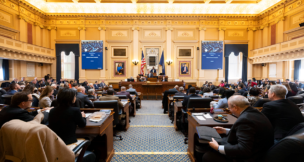The end of innocence
First, a remembrance of English lessons long passed: The Romantic Period (c. 1770-1850) was an artistic, literary and social movement. Originating in Europe and spreading across the Western world, it emphasized the primacy of emotions, aesthetics and the natural world in human experience, largely as a reaction to the cold rationalism of the Industrial Revolution.
Blake, Wordsworth, Byron, Coleridge, Shelley and Keats were popular Romantic poets in England. On this side of the pond, Longfellow, Emerson, Poe and Whitman were among American representatives of the movement. A common poetic theme was innocence versus experience, often expressed as mourning for the loss of intense youthful emotions as a result of growing older.
Experience does make a difference. Our passion for issues and events naturally moderates as we observe with greater insight that most upsides also have a downside. With patience, we can often learn from things that run counter to first impressions.
Lately, I’ve been surprised by a few things. Who would have guessed that management at the Volkswagen assembly plant in Chattanooga, Tenn., would not oppose an organizing vote by the United Auto Workers? The South has attracted many automakers in recent decades largely because of its right-to-work laws. Still, the organizing attempt failed because the workers rejected it. Good for them, but the lack of management opposition to the union vote still is counterintuitive, at least for me.
Around the same time up in DeeCee, the House approved a higher debt-ceiling limit without conditions. A year ago, this was unthinkable because of increasing opposition to higher federal debt. This time, for the most part, the vote barely raised an eyebrow.
In Richmond, just four years ago, Virginia Attorney General Ken Cuccinelli instructed state universities to remove policy language extending anti-discrimination protections to sexual minorities.
In January, newly minted AG Mark Herring refused to defend Virginia’s constitutional amendment defining marriage solely as a bond between one man and one woman. The amendment, passed in 2006, has now been found unconstitutional in a federal District Court.
For that matter, who would’ve guessed four years ago that Bob and Maureen McDonnell would be under federal indictment? How quickly things change.
More trends: Reports indicate that the Tea Party is losing its ability to raise the kind of cash needed to win in today’s PAC-heavy electoral environment. At the same time, the Christian right seems to be losing its vise-like hold on Republican politics.
On the Democratic front, African-Americans suddenly find themselves sharing hard-won political influence with growing numbers of Hispanic and Asian voters. Who would’ve thought that changes to the status quo in both major parties would be coming so quickly?
This year’s population demographics become next year’s voter demographics. Cultural and demographic norms are moving targets. Change is like that — it sneaks up on you.
In Virginia, the 2014 General Assembly regular session was not one that anybody would call remarkable for its legislation. Even the much-touted ethics reform bill turned out pretty weak. Truth be told, the bar just isn’t set very high for Gov. Terry McAuliffe. His requirements to look good on the job are about the same as those for an Episcopal priest — just keep your marriage in good order and don’t get drunk in public.
We’ll see what happens with Medicaid expansion, McAuliffe’s signature issue for his first legislative session. (It was scheduled to be tackled in a special session beginning in late March.) The governor faced pretty stiff opposition from Republican legislators clinging to the idea that sending a message to Washington is more important than taking care of business at home.
For legislators, perhaps this really is an end of innocence. For a while now, their primary goal has been to ensure re-election and local power through gerrymandered districts.
Their reasoning seems to be that picking the right voters concentrates power in the hands of one party. That’s the innocence side of the equation.
The experience side shows that while tightly gerrymandered districts fix results for the party at the district level, they fail miserably at nominating candidates who can win statewide or national races, where a broader appeal is needed. The bigger the geography, the bigger the tent required to win.
What’s more is that single-party control also fails miserably at the business of governing. Statesmanship is the art of compromise, not to be confused with slamming a one-party agenda through the legislature — railroad jobs turn into train wrecks. There’s a reason our democracy was founded on the principle of a two-party system; it simply works better.
Recently our legislative process has been contentious, divisive and generally nonproductive. Let’s hope experience will ultimately overcome innocence, lessen the emotional intensity and replace it with effectiveness.















